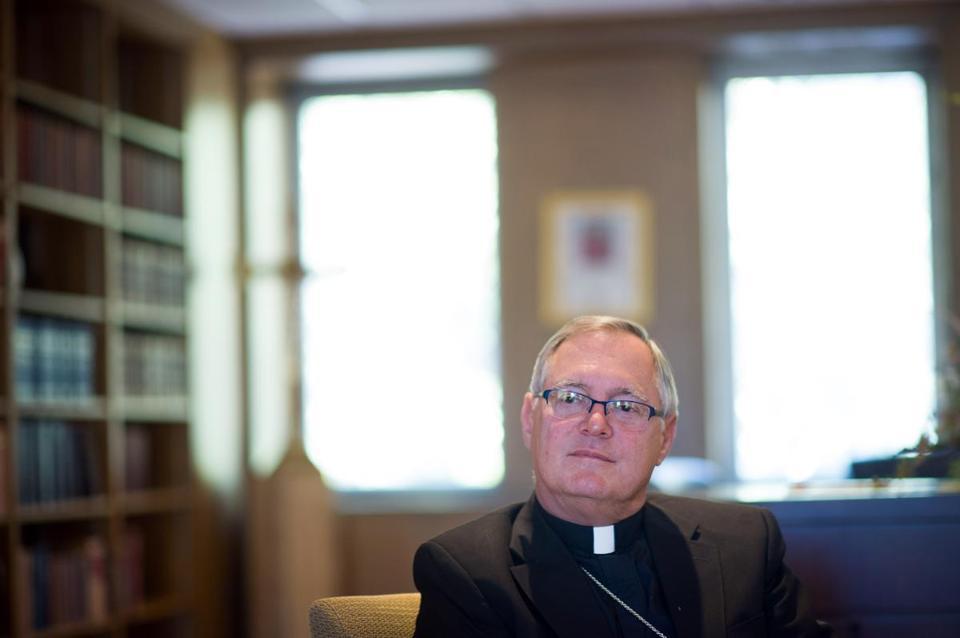|
Judge not lest ye be judged
By Kevin Cullen
Pope Francis made a powerful statement last week without saying a word. His silent visit to Auschwitz allowed the stilled voices of all those murdered there to be heard. The pope’s respectful silence showed that moral authority does not have to be shouted, that sometimes it’s what you don’t say that speaks louder. The pope has gone some way toward restoring some of the moral authority of a church that was severely eroded by generations of covering up the sexual abuse of young people by priests. His success has been rooted as much in how he says things as what he says. “Who am I to judge?” he says, and for someone who is deemed infallible on matters of his faith he has managed to maintain the tenets of Catholic teaching without coming off like a self-righteous, judgmental know-it-all. And then there’s the bishop of Providence. Every once in a while, Bishop Tom Tobin comes up with an ecclesiastical dope slap, a bracing reminder that not all of the hierarchy agree with the pope’s distaste for judgmental finger-wagging. Years ago, Tobin decreed that Patrick Kennedy, then a Rhode Island congressman, should be denied Communion because Kennedy supported abortion rights. When Nelson Mandela died, Tobin denounced Mandela’s “shameful promotion of abortion” in South Africa. Last week, the good bishop took to his Facebook page to take a slap at Tim Kaine, the Democratic vice presidential nominee. “Tim Kaine has been widely identified as a Roman Catholic. It is also reported that he publicly supports ‘freedom of choice’ for abortion, same-sex marriage, gay adoptions, and the ordination of women as priests,” Tobin wrote. “All of these positions are clearly contrary to well-established Catholic teachings; all of them have been opposed by Pope Francis as well. Senator Kaine has said, ‘My faith is central to everything I do.’ But apparently, and unfortunately, his faith isn’t central to his public, political life.” And apparently, and unfortunately, as he sits in judgment of others, Bishop Tobin’s obsession with following Catholic teaching didn’t apply to the cases of Helen McGonigle and Jeff Thomas. Tobin’s response in those cases was not pastoral, it was dryly legalistic. It was not in keeping with the well-established Catholic teachings of humility and compassion. A month before Tobin called Kaine out, Tobin’s lawyers succeeded in getting lawsuits against him by McGonigle and Thomas thrown out. The Rhode Island Supreme Court upheld a lower court ruling that agreed with the bishop’s lawyers that McGonigle and Thomas didn’t file their suits in time. The opinion notes that Tobin and his lawyers did not dispute that a pedophile priest named Brendan Smyth sexually abused both McGonigle and Thomas between 1967 and 1970 when they were prepubescent students at Our Lady of Mercy School in East Greenwich. They even stipulated there was a coverup of Smyth’s crimes. But they successfully argued that, under Rhode Island law, McGonigle and Thomas should have filed suit by 1985, instead of after they began to remember and process the abuse in 2005. Tobin may have been standing on firm legal ground, but what about that vaunted moral ground, the lost moral ground his church is trying so desperately to regain? He didn’t resort to the good book. He resorted to the law book. He won on a technicality, not with spirituality. The opinion backing the bishop was written by someone who knows him well, Justice Francis Flaherty, president of the St. Thomas More Society, a Catholic lawyers’ group. McGonigle and Thomas, whose requests to meet Tobin were denied, are crushed. “Tobin’s stance that we were too late for justice is cruel beyond measure,” McGonigle told me. “His cruelty is astonishing in the face of his self-righteous attitude toward various individuals.” McGonigle’s sister Kathy was also one of Smyth’s victims. But neither Kathy nor McGonigle’s brother Gerry is here to explain how their respective families were ruined. They killed themselves. Contact: cullen@globe.com
|
.
Any original material on these pages is copyright © BishopAccountability.org 2004. Reproduce freely with attribution.
